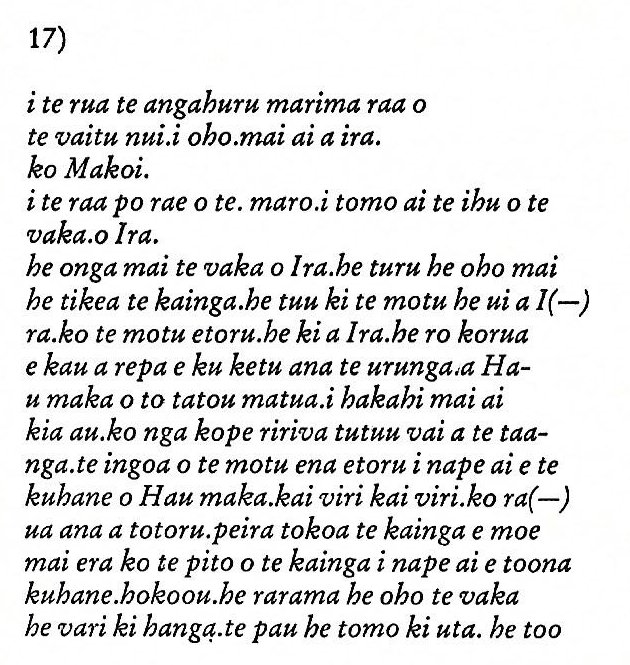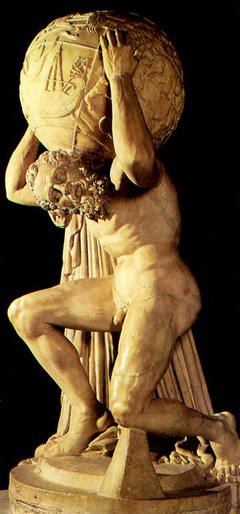
|
E:17 |
| i te rua te angahuru marima raa o |
On the twenty-fifth day [raa]
of the first month ('Vaitu Nui'), Ira and Makoi set sail;
on the first day [te raa po rae] of the month of June
('Maro'), the bow [te ihu] of Ira's canoe touched land
again. |
| te vaitu nui.i oho.mai ai a ira. |
| ko Makoi. |
| i te raa po rae o te.maro.i tomo ai te ihu o
te |
| vaka.o Ira. |
| he onga mai te vaka o Ira.he
turu he oho mai |
Ira's canoe appeared on the distant horizon,
came closer on its course, and
sailed along, |
|
Turu To come down, to go down, to descend;
ka-turu-age koe ki tai, go down to the sea now; turuga,
coming down, descent. Rima hakaturu, generous,
liberal, munificent. Vanaga. 1. To fall in drops, to flow, to
leak, to descend, a drop; turu ki tai, to take refuge at
sea; hakaturu, to cause to descend, to lower, to take
soundings; hakaturuturu, to heave and pitch. Turuga,
declivity. Turuvai, water conduit. P Mgv.: akaturu,
to conduct water in a drain. Ta.: tuturu, to fall in
drops. 2. To stay, to prop. T Pau.: turu, a post, pillar,
to sustain. Mgv.: turu, a support, rod, stay, to sustain.
Ta.: turu, stay, support; turuturu, posts of a
house. Ha.: kukulu, a pillar, a post. 3. To come, to
arrive, to overcome; tehe e turu, through and through;
hakarava hakaturu, quadrangular. Churchill. KULU¹,
s. Haw., a drop of
any liquid, a globule; v.
to drop, as water, to leak, to flow, fall down, tumble over.
Sam., tului,
to drop into, as lotion in the eye; tulu-vao,
drops from trees after rain; tulu-tulu,
the eaves of a house; tutulu,
to leak, as a house, to weep.
Tah., tuturu,
to drop, as rain from a house. N. Zeal., maturu-turu,
to trop as rain. Fiji., turu,
drop, as water; s.
eaves of a house, a drop of water.
Malg., kuala,
canal, water-course.
Sanskr., kûlya, a
rivulet, a canal; kûlinî,
a river. Perhaps guda,
gola, a ball.
In Dravidian (Tamil),
tûru means to drizzle, scatter,
spread about. KULU²,
v. Haw., sleep little, doze, dream, be in a trance;
kulukulu, id.
Jav., turu,
sleep. Sunda, kulem,
id. Malg., ma-turu,
id. Tagal., tolog,
id. Icel., dura,
sleep little, doze; durnin,
sleepy. Sax., dol,
wandering in intellect, stupid; dwolian,
to wander, rave. Engl., dolt.
Goth., dwals,
foolish. Swed., dwala,
trance. KULU³, v.
Haw., obsol; kukulu,
v., to set up, erect, to build.
Tah., turu,
prop, side-post of a house; tuturu,
tauturu, to support,
help, assist. Marqu., tutu'u,
id. Paum., turu,
a prop, post to support the roof. Mang., turu,
id. Malg., zuru,
column, support. Fiji., duru,
the shorter posts of a house, on which the wall-plate rests.
Sanskr., tul,
to lift, to weigh, ponder, attain; tul-ana,
lifting; tulâ,
balance; dul, to
raise, to swing; dola,
a swing. Lat.,
tollo, tuli,
to lift, raise, elevate; tolero,
to bear, endure. Greek,
τλαω (ταλαω),
to take upon oneself, to bear, suffer; τολμαω,
to undertake, hold out, endure; ταλαντον,
a balance; ταλαρος, a
basket; τελαμων, a
strap, belt; Άτλας, a
mountain in Africa, supposed to support the heavens;
ότλος, suffering, distress.
Goth., thulan,
to tolerate, suffer; ga-thlahan,
take in the arms, caress.
(Fornander) |
| he tikea te kainga.he tuu ki te motu he ui a
I(-) |
and finally (one) could see [he tikea]
the (new home) land.The canoe reached [he tuu ki] the
islets (off the coast), and Ira saw [he ui a Ira] that
there were three such islets [ko te motu etoru]. Ira said
[he ki a Ira], 'Hey you, crew of young men, the vision [urunga]
of Hau Maka, our father, which he revealed to me, has come true. |
| ra.ko te motu etoru.he ki a Ira.he ro korua |
| e kau a repa e ku
ketu ana
te urunga.a Ha(-) |
|
Repa. Youngster; also used instead of repahoa.
Repahoa friend. Vanaga. Repa hoa, male friend,
intimate, comrade, fellow student; repa hoa titika,
trusty friend. Churchill. |
| Ketu. To bound, to climb
over, to leap, to jump, to raise (keetu). Mq. ketu,
to raise, to lift. Ketuketu, to spread out, hihi
ketuketu, to turn back the eyelids. Churchill. Pau.:
Ketuketu, to dig. Ta.: etuetu, id. Mq.: ketu,
to dig up with the snout. Ma.: ketu, id. Churchill. Mq.:
ketuketu, to snuff a candle. Sa.: eueu, id.
Churchill. |
| Uru. 1. To lavish food on
those who have contributed to the funerary banquet (umu
pâpaku) for a family member (said of the host, hoa pâpaku).
2. To remove the stones which have been heated in the umu,
put meat, sweet potatoes, etc., on top of the embers, and cover
it with those same stones while red-hot. 3. The wooden tongs
used for handling the red-hot stones of the umu. 4. To
enter into (kiroto ki or just ki), e.g. he-uru
kiroto ki te hare, he-uru ki te hare. 5. To get dressed:
kahu uru. Vanaga. Uruga. Prophetic vision. It is said
that, not long before the first missionaries' coming a certain
Rega Varevare a Te Niu saw their arrival in a vision and
travelled all over the island to tell it: He-oho-mai ko Rega
Varevare a Te Niu mai Poike, he mimiro i te po ka-variró te
kaiga he-kî i taana uruga, he ragi: 'E-tomo te haûti i Tarakiu,
e-tomo te poepoe hiku regorego, e-tomo te îka ariga koreva,
e-tomo te poporo haha, e-kiu te Atua i te ragi'. I te otea o te
rua raá he-tu'u-hakaou ki Poike; i te ahi mo-kirokiro he-mate.
Rega Varevare, son of Te Niu, came from Poike,
and toured the island proclaiming his vision: 'A wooden house
will arrive at Tarakiu (near Vaihú), a barge will
arrive, animals will arrive with the faces of eels (i.e.
horses), golden thistles will come, and the Lord will be heard
in heaven'. The next morning he arrived back in Poike,
and in the evening when it was getting dark, he died. Vanaga.
Uru manu. Those who do not belong to the Miru tribe
and who, for that reason, are held in lesser esteem. The low
entrances of houses were guarded by images of wood or of bark
cloth, representing lizards or rarely crayfish. The bark cloth
images were made over frames of reed, and were called
manu-uru, a name given also to kites, masks, and masked
people. Métraux. Úru-úru. To catch small fish to use as
bait. Uru-uru-hoa. Intruder, freeloader (person who
enters someone else's house and eats food reserved for another).
Vanaga. 1. To enter, to penetrate, to thread, to come into port
(huru); uru noa, to enter deep. Hakauru,
to thread, to inclose, to admit, to drive in, to graft, to
introduce, penetrate, to vaccinate, to recruit. Akauru,
to calk. Hakahuru, to set a tenon into the mortise, to
dowel. Hakauruuru, to interlace; hakauruuru mai te vae,
to hurry to. 2. To clothe, to dress, to put on shoes, a crown.
Hakauru, to put on shoes, to crown, to bend sails, a
ring. 3. Festival, to feast. 4. To spread out the stones of an
oven. Uruuru, to expand a green basket. 5. Manu uru,
kite. Uruga (uru 1). Entrance. Churchill. Ta.:
uru, the human skull. Mq.: uu, the head. Sa.: ulu,
id. Moriori: ulu, id. Uru, make even.
Kapingamarangi. |
| u maka o to tatou matua.i hakahi mai ai |
These are the handsome sons of Te
Taanga, who are standing in the water', for this is the name [te
ingoa] that the dream soul of Hau Maka gave them.
Unforgotten (? kai viri kai viri) are they, these three. |
| kia au.ko nga kope
ririva tutuu vai a te taa(-) |
| nga.te ingoa o te motu ena etoru i nape ai e
te |
| kuhane o Hau maka.kai viri kai viri.ko ra(-) |
Viri. 1. To wind, to coil, to roll up; he viri i
te hau, to wind, coil a string (to fasten something). 2. To
fall from a height, rolling over, to hurl down, to fling down.
Viriviri, round, spherical (said of small objects).
Viviri te henua, to feel dizzy (also: mimiro te
henua). Vanaga. To turn in a circle, to clew up, to groom,
to twist, to dive from a height, to roll (kaviri).
Hakaviri, crank, to groom, to turn a wheel, to revolve, to
screw, to beat down; kahu hakaviri, shroud. Viriga,
rolling, danger. Viriviri, ball, round, oval, bridge,
roll, summit, shroud, to twist, to wheel round, to wallow.
Hakaviriviri, to roll, to round; rima hakaviriviri,
stroke of the flat, fisticuff. P Pau.: viriviri, to
brail, to clew up; koviriviri, twisting. Mgv.: viri,
to roll, to turn, to twist; viviri, to fall to the ground
again and again in a fight. Mq.: vii, to slide, to roll,
to fall and roll. Ta.: viri, to roll up, to clew up.
Viritopa, danger. Mgv.: Viripogi, eyes heavy with
sleep. Mq.: viipoki, swooning, vertigo. Churchill. Viti:
vili, to pick up fallen fruit or leaves ... In Viti
virimbai has the meaning of putting up a fence (mbai
fence); viri does not appear independently in this use,
but it is undoubtedly homogenetic with Samoan vili, which
has a basic meaning of going around; virikoro then
signifies the ring-fence-that-goes-about, sc. the moon. In the
Maori, aokoro is the cloud-fence ... Churchill 2.
|
 |
|
viri |
| 59 |
 |
520 |
 |
481 |
 |
270 |
 |
| Ab1-1 |
Ab7-26 |
Aa5-7 |
Aa8-26 |
| 580 = 20 * 29 |
754 = 26 * 29 |
|
| ua ana a totoru.peira tokoa te kainga e moe |
And therefore [peira] this is
the (right) land lying there; this is Te Pito O Te Kainga, which
also received its name from the dream soul.' |
| mai era ko te pito o te kainga i nape ai e
toona |
| kuhane.hokoou.he rarama he oho te vaka |
The canoe continued its exploration
and in a sweep [he vari] sailed on to Hanga Te Pau. |
| he vari ki hanga.te pau he tomo ki uta. he
too |
|
Uta. Higher up (from the coast, or from another
place); i uta era, further up, up there; ki î te îka i
uta, as there are lots of fish on the beach. Vanaga. 1.
Inland, landward; paepae ki uta, to strand, to run
aground; mouku uta, herbage. 2. To carry; uta mai,
to import; hakauta, to give passage. Campbell. |

|